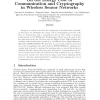Free Online Productivity Tools
i2Speak
i2Symbol
i2OCR
iTex2Img
iWeb2Print
iWeb2Shot
i2Type
iPdf2Split
iPdf2Merge
i2Bopomofo
i2Arabic
i2Style
i2Image
i2PDF
iLatex2Rtf
Sci2ools
WIMOB
2008
IEEE
2008
IEEE
On the Energy Cost of Communication and Cryptography in Wireless Sensor Networks
Energy is a central concern in the deployment of wireless sensor networks. In this paper, we investigate the energy cost of cryptographic protocols, both from a communication and a computation point of view, based on practical measurements on the MICAz and TelosB sensors. We focus on the cost of two key agreement protocols: Kerberos and the Elliptic Curve Diffie-Hellman key exchange with authentication provided by the Elliptic Curve Digital Signature Algorithm (ECDH-ECDSA). We find that, in our context, Kerberos is around one order of magnitude less costly than the ECDH-ECDSA key exchange and confirm that it should be preferred in situations where a trusted third party is available. We also observe that the power dedicated to communications can become a central concern when the nodes need to stay in listen mode, e.g. between the protocol rounds, even when reduced using a Low Power Listening (LPL) protocol. Therefore, listening should be considered when assessing the cost of cryptogr...
Central Concern | Cryptographic Protocols | Elliptic Curve Digital Signature Algorithm | Mobile Computing | WIMOB 2008 |
| Added | 01 Jun 2010 |
| Updated | 01 Jun 2010 |
| Type | Conference |
| Year | 2008 |
| Where | WIMOB |
| Authors | Giacomo de Meulenaer, François Gosset, François-Xavier Standaert, Olivier Pereira |
Comments (0)

